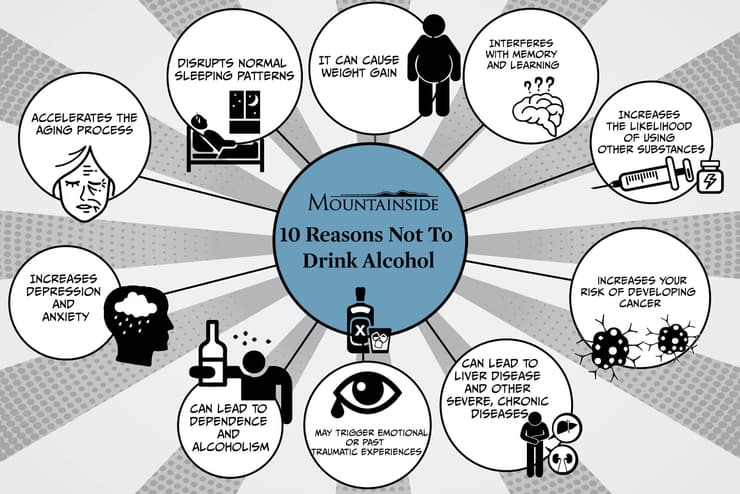Alcohol abuse can have severe consequences on both physical and mental health. While it may seem difficult to quit drinking, understanding the numerous reasons to do so may give you the motivation needed to embark on a journey toward sobriety. Below are 10 compelling reasons to quit alcohol and shed light on the far-reaching effects this decision can have on your well-being.
1. Alcohol’s Devastating Impact on Physical Health
The physical toll of alcohol abuse cannot be overstated. From liver damage to an increased risk of cancer, alcohol consumption can wreak havoc on various organs and systems within the body:
- Liver damage: One of the most widely recognized consequences of alcohol abuse is liver damage. The liver plays a crucial role in processing alcohol, but excessive and prolonged alcohol consumption can lead to severe complications.
- Adverse effects on the heart: Alcohol poses significant risks to the heart, particularly when combined with other unhealthy habits, such as smoking or poor dietary choices. Drinking alcohol can cause abnormal stretching and weakening of the heart muscles, known as cardiomyopathy.
- Pancreatic complications: The pancreas is also susceptible to the harmful effects of alcohol abuse. When alcohol is consumed, the pancreas produces toxic substances that can lead to pancreatitis.
- Increased risk of cancer: Research has established a clear link between alcohol consumption and an elevated risk of developing various types of cancer. Head and neck cancers, including those of the mouth, throat, and voice box, are more common among drinkers.
2. Indirect Risks to Physical Health
In addition to the direct physical effects of alcohol abuse, numerous indirect risks can happen as well. Alcohol-related crimes, drunk driving, and substance abuse are just a few of the dangers that can arise from excessive alcohol consumption:
- The link between alcohol and crime: Alcohol consumption has been strongly linked to various forms of criminal behavior, such as robberies, intimate partner violence, sexual assaults, physical assaults, and homicides.
- Drunk driving: One of the most alarming consequences of alcohol abuse is the high incidence of alcohol-impaired driving. In 2016 alone, nearly 10,500 individuals lost their lives in alcohol-related driving crashes, accounting for approximately 30% of all traffic deaths that year.
- Substance abuse and drug use: The inhibitory effects of alcohol often lead individuals to make impulsive decisions they would not otherwise make. Binge drinking has been strongly correlated with the use of illicit drugs such as amphetamines, cocaine, heroin, hallucinogens, and more. The combination of alcohol and drugs can result in harmful consequences, including overdose and death.
3. The Dangers of Alcohol Consumption During Pregnancy
Pregnant women must be particularly cautious when it comes to alcohol consumption. The risks associated with drinking during pregnancy are high; any amount of alcohol can be harmful to the developing fetus:
- Alcohol’s impact on the fetus: Alcohol crosses the placenta, exposing the developing embryo to its toxic effects. Fetal alcohol spectrum disorder (FASD) is a severe condition that can result from alcohol exposure during pregnancy. Children born with FASD may experience a range of physical and cognitive disabilities, including abnormal facial features, hyperactivity, learning disabilities, poor judgment, and issues with the heart, kidney, or bones.
4. Mental Health Effects of Alcohol Abuse
Alcohol has a profound impact on the brain and can exacerbate existing mental health conditions while also predisposing individuals to the development of new ones. While some may turn to alcohol as a temporary escape from mental illness, the depressive effects of alcohol can worsen symptoms in the long run.
- Alcohol and major depression: Alcohol use disorder (AUD) commonly co-occurs with major depression, exacerbating the symptoms of both conditions. The cyclic relationship between alcohol abuse and depression can create a challenging cycle to break, making it essential to address both issues simultaneously.
- Bipolar disorder and alcohol abuse: Bipolar disorder is another mental illness frequently associated with alcohol use. Mental health professionals must recognize the close connection between bipolar disorder and alcohol use disorder to provide effective treatment.
- Anxiety disorders and alcohol: While anxiety disorders may not occur more frequently among heavy drinkers, individuals with anxiety issues often turn to alcohol as a temporary relief. Unfortunately, this reliance on alcohol can perpetuate the cycle of anxiety and lead to further complications.
5. Impact on Friends and Family
Alcohol abuse not only affects the individual but also has a profound impact on the relationships with friends and family. Excessive alcohol consumption can push loved ones away and create a sense of constant worry and anxiety for their well-being.
- Strained relationships: Always being drunk at social events or during inappropriate times can strain relationships with friends and family. This behavior can create distance and isolation, leading to a breakdown in communication and support.
- Constant concern: When alcohol abuse reaches dangerous levels, loved ones often experience constant worry and anxiety. They may constantly question whether the individual is safe and whether they have gotten hurt or are engaging in risky behaviors. This persistent concern weighs heavily on the mental and emotional well-being of those affected.
6. Risk of Developing Alcohol Use Disorder
Alcohol is not only physically harmful but also highly addictive. Developing a high-volume drinking habit can lead to chemical dependence and AUD, making it difficult to quit and subjecting individuals to alcohol withdrawal symptoms.
- Chemical dependence and alcohol withdrawal: Regular and excessive alcohol consumption can lead to chemical dependence, where the brain becomes reliant on alcohol to function properly. Abruptly stopping alcohol consumption can result in alcohol withdrawal symptoms, which can range from mild discomfort to life-threatening conditions such as delirium tremens (DTs).
- Binge drinking in young adults: Engaging in high-volume drinking at a young age puts individuals at a higher risk of developing alcohol use disorder and experiencing the associated complications.
7. The Danger of Suicide
Alcohol abuse increases the risk of suicide, making it a critical issue that should not be taken lightly. The depressive effects of alcohol, coupled with reduced impulse control, create a dangerous environment for individuals struggling with mental illness.
- Alcohol and suicide statistics: Tragically, nearly 30% of suicide victims in the United States have alcohol in their systems at the time of death. Individuals with AUD are between 60 and 120 times more likely to commit suicide compared to those without psychiatric illnesses.
8. The Financial Cost of Alcohol Abuse
Maintaining a drinking habit comes at a significant financial cost. From the expense of purchasing alcohol to the potential financial consequences of alcohol-related incidents, alcohol abuse can drain resources and lead to financial instability.
- The cost of alcohol consumption: The sheer cost of purchasing alcohol on a daily or weekly basis can quickly add up. Cutting out alcohol can result in substantial savings that can be allocated to other areas of life.
- Additional financial consequences: Medical expenses incurred due to alcohol-related injuries, legal fees resulting from DUI offenses, and the cost of alcohol treatment can all create significant financial strains.
9. Alcohol Abuse and Employment
Sustained alcohol abuse can have a detrimental impact on employment. Persistent alcohol-related issues can interfere with work responsibilities and jeopardize job security.
- Impaired work performance: Showing up to work hungover or intoxicated can diminish productivity, undermine professional relationships, and increase the likelihood of work-related accidents or mistakes.
- DUI and license suspension: One of the common consequences of alcohol abuse is receiving a DUI. In most states, a DUI results in an immediate license suspension, which can severely hinder one’s ability to commute to work. The loss of a driver’s license can ultimately lead to unemployment if alternative transportation options are limited.
10. The Impact on Nutrition
Alcohol consumption can have adverse effects on nutrition, particularly due to its high-calorie content and lack of nutritional value. Limiting alcohol intake can support healthier dietary choices and overall well-being.
- Caloric content of alcoholic beverages: Alcoholic beverages vary in their caloric content, with some containing significantly more calories than others. Beer, distilled alcohol, mixed drinks, and wine all contribute to calorie intake and can impede efforts to maintain a balanced diet.
- Empty calories and dietary choices: Alcohol provides empty calories, meaning it offers little to no nutritional value. These excess calories can contribute to weight gain and hinder efforts to achieve optimal nutrition. Cutting back on alcohol consumption allows individuals to prioritize healthier food choices and maintain a more balanced diet.
If those 10 reasons to stop drinking alcohol aren’t enough, there are even more reasons to quit alcohol entirely:
- Alcohol can interfere with memory. Research shows that alcohol abuse can increase your chances of developing Alzheimer’s disease by 300 percent.
- Alcohol can trigger traumatic memories or post-traumatic stress disorder (PTSD) episodes. PTSD is often a co-occurring disorder with AUD because individuals use alcohol to block out trauma. However, the intoxicating effects of alcohol can trigger flashbacks and aggressive behavior, particularly during blackouts.
- Alcohol makes you age faster, externally and internally. Recent studies have shown that alcohol can speed up the biological aging process.
Alcohol abuse poses significant risks to both physical and mental health. From the damaging effects on vital organs to the potential for addiction and the strain it places on relationships and finances, there are numerous compelling reasons to quit drinking alcohol. By understanding these reasons and seeking appropriate support and treatment, individuals can embark on a journey toward sobriety and reclaim their well-being. Remember, seeking help is a sign of strength and a step towards a healthier and happier life.
If you or a loved one is struggling with addiction, Mountainside can help.
Click here or call (888) 833-4676 to speak with one of our addiction treatment experts.

 By
By 







